
New Horizons in Biotechnology

PAYBACK Punkte
76 °P sammeln!
The practice of biotechnology, though different in style, scale and substance in globalizing science for development involves all countries. Investment in biotechnology in the industrialised, the developing, and the least developed countries, is now amongst the widely accepted avenues being used for economie development. The simple utilization of kefir technology, the detoxification of injurious chemical pesticides e.g. parathion, the genetic tailoring of new crops, and the production of a first of a kind of biopharmaceuticals illustrate the global scope and content of biotechnology research e...
The practice of biotechnology, though different in style, scale and substance in globalizing science for development involves all countries. Investment in biotechnology in the industrialised, the developing, and the least developed countries, is now amongst the widely accepted avenues being used for economie development. The simple utilization of kefir technology, the detoxification of injurious chemical pesticides e.g. parathion, the genetic tailoring of new crops, and the production of a first of a kind of biopharmaceuticals illustrate the global scope and content of biotechnology research endeavour and effort. In the developing and least developed nations, and in which the 9 most populous countries· are encountered, problems concerning management of the environment, food security, conservation of human health resources and capacity building are important factors that influence the path to sustainable development. Long-term use of biotechnology in the agricultural, food, energyand health sectors is expected to yield a windfall of economic, environmental and social benefits. Already the prototypes of new medicines and of prescription fruit vaccines are available. Gene based agriculture and medieine is increasingly being adopted and accepted. Emerging trends and practices are reflected in the designing of more efficient bioprocesses, and in new research in enzyme and fermentation technology, in the bioconversion of agro industrial residues into bio-utility products, in animal healthcare, and in the bioremediation and medical biotechnologies. Indeed, with each new day, new horizons in biotechnology beckon.














